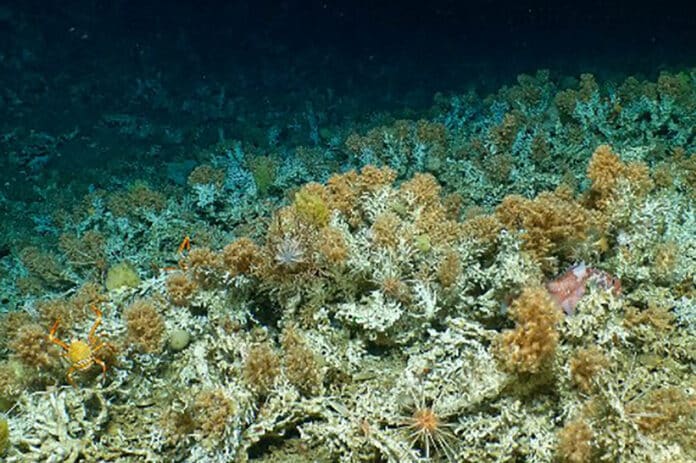Scientists from the University of Bristol are part of an expedition recently made first of its kind of groundbreaking discovery. They discovered extensive, ancient deep-sea coral reefs within the Galápagos Marine Reserve (GMR).
The Galapagos Marine Reserve is one of the world’s largest and most biologically diverse marine protected areas (MPAs).
The team has been conducting a four-week expedition in the Galápagos Islands to monitor sea corals, lavas, and the spectacular marine life surrounding them.
Dr. Michelle Taylor from the University of Essex and Dr. Stuart Banks from the Charles Darwin Foundation recorded the reef structure while diving in the deep-sea research submersible Alvin, operated by the Woods Hole Oceanographic Institution (WHOI, USA).
The first reef discovered hosted an incredible variety of deep marine life. It was discovered at 400-600m (1,310-1,970 feet) depth at the summit of a previously uncharted location in the middle of the archipelago.
Dr. Samuel Mitchell, a volcanologist from Bristol’s School of Earth Sciences, said: “On deep-sea expeditions of this kind, you can plan and plan and still always be surprised by what you find. But sometimes you do just come across the unexpected.”
“The first moments seeing the footage of this reef was met with gasps from the scientists onboard, and the wonder and excitement from the scientists who observed the reef in Alvin were palpable.”
“We’ve used the submersible Alvin to dive on some amazing locations, all of which will help Bristol scientists better understand the history of the Galápagos Platform through analyzing sampled deep-sea corals, but the discovery of this extensive reef will open up new science questions and directions for the coming years.”
James Kershaw said: “By collecting water samples from near this reef, we can study the food supply and conditions which these corals need to survive. This helps us to understand the threats to these environments in the future.”
Yingchu Shen added: “The live and fossil deep-sea corals collected can help us better understand the past and present East Equatorial Pacific and benefit future ocean change projections and marine protection strategy. We look forward to welcoming the samples back to Bristol and seeing what stories of the ocean and climate they will tell us!”
